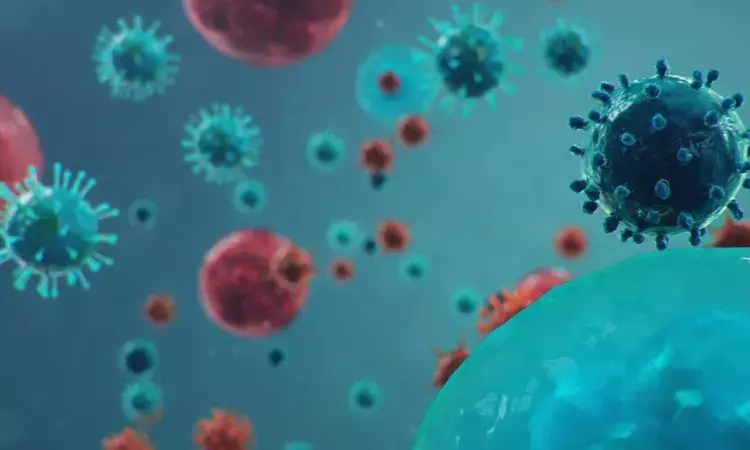- Home
- Medical news & Guidelines
- Anesthesiology
- Cardiology and CTVS
- Critical Care
- Dentistry
- Dermatology
- Diabetes and Endocrinology
- ENT
- Gastroenterology
- Medicine
- Nephrology
- Neurology
- Obstretics-Gynaecology
- Oncology
- Ophthalmology
- Orthopaedics
- Pediatrics-Neonatology
- Psychiatry
- Pulmonology
- Radiology
- Surgery
- Urology
- Laboratory Medicine
- Diet
- Nursing
- Paramedical
- Physiotherapy
- Health news
- Fact Check
- Bone Health Fact Check
- Brain Health Fact Check
- Cancer Related Fact Check
- Child Care Fact Check
- Dental and oral health fact check
- Diabetes and metabolic health fact check
- Diet and Nutrition Fact Check
- Eye and ENT Care Fact Check
- Fitness fact check
- Gut health fact check
- Heart health fact check
- Kidney health fact check
- Medical education fact check
- Men's health fact check
- Respiratory fact check
- Skin and hair care fact check
- Vaccine and Immunization fact check
- Women's health fact check
- AYUSH
- State News
- Andaman and Nicobar Islands
- Andhra Pradesh
- Arunachal Pradesh
- Assam
- Bihar
- Chandigarh
- Chattisgarh
- Dadra and Nagar Haveli
- Daman and Diu
- Delhi
- Goa
- Gujarat
- Haryana
- Himachal Pradesh
- Jammu & Kashmir
- Jharkhand
- Karnataka
- Kerala
- Ladakh
- Lakshadweep
- Madhya Pradesh
- Maharashtra
- Manipur
- Meghalaya
- Mizoram
- Nagaland
- Odisha
- Puducherry
- Punjab
- Rajasthan
- Sikkim
- Tamil Nadu
- Telangana
- Tripura
- Uttar Pradesh
- Uttrakhand
- West Bengal
- Medical Education
- Industry
Nasal drops with IgA antibodies could protect against COVID-19: Study

Two Covid Deaths in 48 Hours Raise Alarm in Ahmedabad
Sweden: A recent study published in PNAS has revealed that nasal drops with IgA antibodies can prevent SARS-CoV-2 infection in mice.
Researchers at Karolinska Institutet in Sweden implied a new way to protect individuals at high risk from different variants of the SARS-CoV-2 (severe acute respiratory syndrome coronavirus 2) virus and possibly other infections.
Different types of antibodies have different functions in the body. IgA antibodies are part of the so-called adaptive immune system and reside naturally in the mucosal membranes of the airways. Absence or low levels of mucosal IgA is known to be associated with an increased risk of SARS-CoV-2 breakthrough infections.
The current COVID-19 vaccines mainly stimulate an IgG antibody response in the body, and earlier studies have shown that their ability to protect against infection with the new Omicron variants of the virus is limited.
To overcome this, the group led by Professor Qiang Pan-Hammarström at Karolinska Institutet used genetic engineering to create IgA antibodies that bind to the SARS-CoV-2 spike protein in a similar way to the IgG antibodies.
Neutralized the virus effectively
Mice infected with the Omicron variant received the IgA antibody treatment through nasal administration. The nasal drops significantly diminished the virus load in the trachea and lungs of the infected mice. The IgA antibodies were shown to bind stronger to the spike protein of SARS-CoV-2 and were more effective in neutralizing the virus compared to the original IgG antibodies.
“The results show that these genetically engineered antibodies can strengthen the protection against new virus variants, but they are not intended to replace current vaccines,” says Harold Marcotte, associate professor at the Department of Medical Biochemistry and Biophysics, Karolinska Institutet, and the first author of the paper.
“Traditional vaccines elicit an active immune response from the body, whereas this is a passive immunization strategy,” he continues. “An active immunization approach that induces a mucosal immune response would be ideal, but hopefully our approach is suitable for protecting the most vulnerable individuals, like the elderly or immunocompromised persons.”
Promising strategy for other infections
There are also hopes that the method can be used to neutralize other current and emerging variants of the virus.
“We believe that this will be a very promising strategy, not only for COVID-19 and the new variants, but also for other infectious diseases, including influenza and other respiratory infections and gastric mucosal infections such as Helicobacter pylori, where there is no vaccine available at the moment”, says Qiang Pan-Hammarström, professor at the same department and last author of the paper.
Reference:
Harold Marcotte, Yunlong Cao, Fanglei Zuo, Qiang Pan-Hammarström, Conversion of monoclonal IgG to dimeric and secretory IgA restores neutralizing ability and prevents infection of Omicron lineages, https://doi.org/10.1073/pnas.2315354120.
Dr Kamal Kant Kohli-MBBS, DTCD- a chest specialist with more than 30 years of practice and a flair for writing clinical articles, Dr Kamal Kant Kohli joined Medical Dialogues as a Chief Editor of Medical News. Besides writing articles, as an editor, he proofreads and verifies all the medical content published on Medical Dialogues including those coming from journals, studies,medical conferences,guidelines etc. Email: drkohli@medicaldialogues.in. Contact no. 011-43720751


